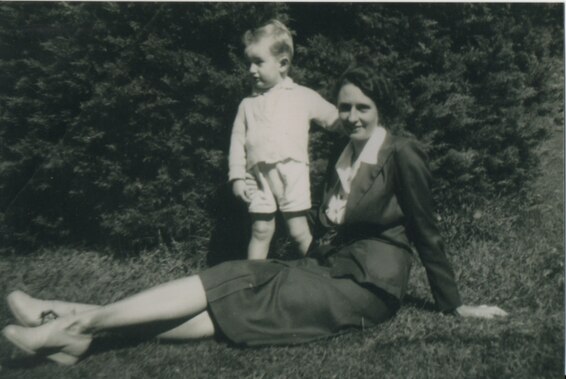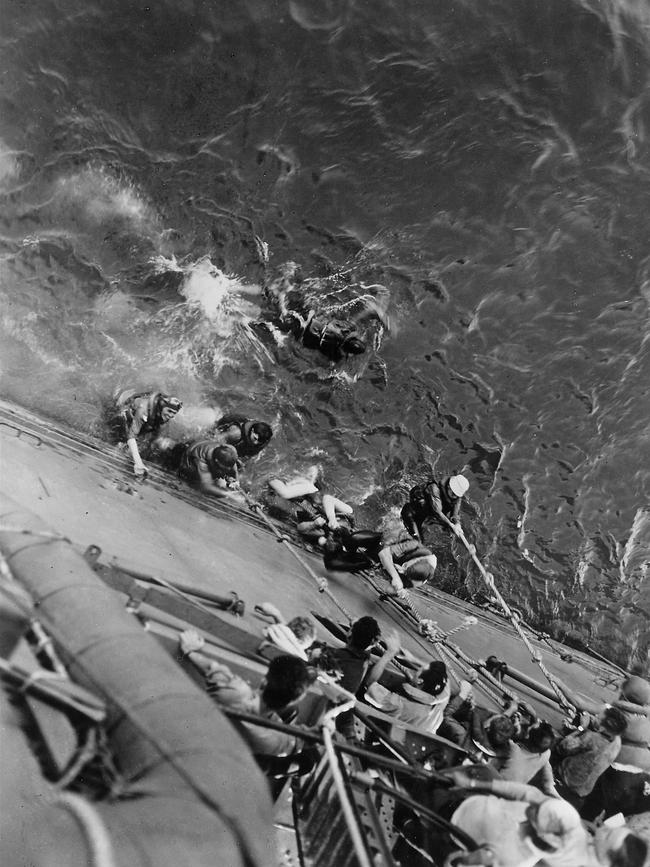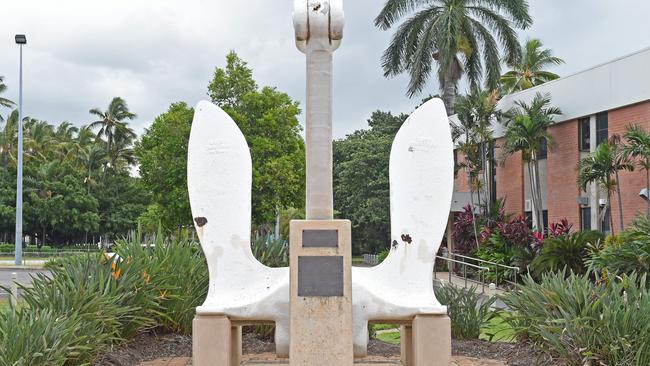Yanks for the memory of my bold and warm-hearted Pop
I was only 14 when my maternal grandfather confessed that he had once been prepared to kill my mother and me.

I was only 14 when my maternal grandfather confessed that he had once been prepared to kill my mother and me, the unborn child in her womb.
According to “Pop” Sorrensen, the only reason we were still alive was because the Yanks won the Battle of the Coral Sea during a four-day engagement off the Queensland coast in May 1942.
The feared invasion by a brutal enemy was thwarted. Pop’s poison stayed in its bottle. And I lived on to help mark the 79th anniversary of the Coral Sea victory this week.
I loved visiting Pop and Grandma in their little housing commission home at Millbank, on the outskirts of Bundaberg. They had a shelf in their lounge room that displayed wedding photos and memorabilia. But what intrigued me the most was a mysterious, small, square wooden box with a red cross on it.
I asked about it a few times when I was younger, but the adults just ignored me.
It was a few weeks after my 14th birthday when, out of the blue, Pop took me into the lounge room and showed me a little empty bottle with the word “poison” printed on the label.
He said I was old enough to know about these things. It was a bottle that once contained poison obtained from a chemist friend in Childers, where the family lived while my dad was away at the war.
It was early 1942 and that part of Australia, above the “Brisbane Line”, was preparing for imminent invasion. Families around Hervey Bay and Childers had been told to evacuate further inland, and I ended up being born in Murgon.
Historians now debate whether the line was merely a rumour, a strategic plan, or a military and political reality.
It was feared the Japanese invasion fleet, which at that stage seemed unstoppable, would first take Port Moresby, and then move south to the lee of Fraser Island, and disgorge battle-hardened soldiers to ravage through the civilian population of Queensland.
Apparently, the government’s patriotic propaganda campaign to promote awareness and strengthen the national resolve was also terrifying the residents of northern Australia to the verge of panic.

Through all through this, Pop had the poison with them, and by agreement, the family would take their own lives rather than be subjected to the expected brutality of the invaders.
Pop told me: “I was responsible for them. My older boys and your father were all away fighting in the war and it looked like we were about to be overrun in this part of Queensland. We made a terrible decision but believed it was the right one at that time. I would do everything I could to protect grandma and your mother, but we would not risk capture.”
He said the turning point had been victory in the Battle of the Coral Sea, when I was only weeks old. Australian ships and aircraft had also been involved, but it was the Americans and their aircraft carriers that took the brunt of the battle and the casualties.
The Japanese advance was also later stopped at Milne Bay and Kokoda, and Pop had tipped that bottle of arsenic into a deep hole and buried it early in 1943.
He told me: “We kept the box and the empty bottle just as a reminder. Whenever you think life is treating you badly, just thank your lucky stars and remember that life is precious. Things can never get as bad as they were back then.”
He looked like he was ready to answer questions, but I couldn’t talk — I couldn’t say anything. Until then I had seen no indication that he was the hugging kind of grandfather, but he reached out and embraced me. I didn’t let him see, but there were tears in my eyes.
Pop always said it was the Yanks and the Battle of the Coral Sea that saved us. My Dad and Uncle Bill said it was the Aussies at Milne Bay and Kokoda. I did not get involved in the debate — I was just eternally thankful that our side won. Historians today question whether the Japanese ever had a serious plan to invade mainland Australia, but that was an impossible call to make in 1942.

In later life, I took a keener interest than most in the US Alliance and Battle of the Coral Sea. I was not an ex-serviceman, but my interest was still deeply personal — I could have become collateral damage in World War II at the hands of my gentle grandfather.
Through unusual circumstance I found myself standing beside the then Australian minister for defence Kim Beazley and Lamar Alexander, the personal envoy of the president of the United States, at the 50th anniversary of the battle in Townsville in 1992.
My protocol role was to escort both VIPs and assist them during the service and wreath-laying on the newly dedicated Coral Sea memorial.
I had heard the Last Post played at many Anzac Day services and had seen what emotion it could release from even hardened old war veterans, but I had always felt like an observer — I was just a civilian.
This time, as the crowd of 15,000 paused for a minute’s silence, even the raucous black cockatoos in the sea almond trees stopped squawking. Then, it happened — I wept openly for the first time in my adult life — not only openly but in front of a huge crowd. I managed to control the sobs inside me, but not the flood of tears.
No one seemed worried by my tears — it was, after all, a very emotional service. However, I am pleased I didn’t have to explain that as those 60 seconds of silent contemplation ticked away, I had heard the voice of my old grandfather from all those years ago and could almost feel that hug again.
Elliot Hannay is a former editor of The Townsville Daily Bulletin. This commentary is in part an extract from his memoir The Colt With No Regrets: Hard copy, hot metal and the power of the written word (Wilkinson Publishing).



To join the conversation, please log in. Don't have an account? Register
Join the conversation, you are commenting as Logout